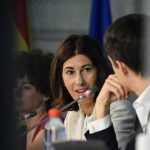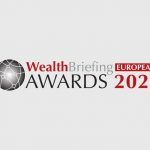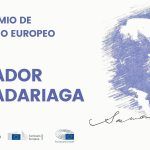The winners of this year’s edition of the Lorenzo Natali Prize, which showcases the EU’s commitment to support journalists around the world, were announced on 26 at a ceremony hosted at the Residence Palace, in Brussels.
The 2024 winners are:
For the Best Emerging Journalist Prize: Jamaima Afridi was awarded this prize for her investigative work on the challenges Afghan refugees face in Pakistan, particularly Afghan women impacted by the Taliban’s return to power. Her reporting sheds light on their struggles with housing, healthcare, and employment. Her impactful investigation, titled ‘As Pakistan begins second phase of deportation, Afghan women fear what lies ahead’ was published in Dawn media.
For the Investigative Journalism Prize: a trio of French journalists formed by Mathilde Cusin, Manon de Couët and Martin Boudot were awarded this prize for their report ‘Armes, l’héritage toxique’ aired on France Télévisions. Their investigation focuses on the environmental dangers posed by unexploded ordnance and military waste in Normandy, emphasising the need for urgent action to address this toxic legacy.
For the Feature Journalism Prize: the journalists Gabriela Ramírez and Tina Xu won this prize for their the article entitled ‘Widowed by Europe’s borders’ published in Unbiased The News. Their compelling article highlights the personal stories of families affected by challenges faced on European migration routes, emphasising the emotional impact of loss and separation.
For the Special Award – Photojournalism: Bienvenido Velasco was recognised for his work ‘Las redes sociales, el engaño que anima a miles de migrantes por la selva del Darién’ published in Agencia EFE. This piece reveals the harsh realities faced by migrants navigating the dangerous Darién Gap, driven by false promises spread through social media. It emphasises the need for greater awareness and support for vulnerable populations undertaking such risky journeys.
The selection process and the Jury
Over 1 200 journalists from across the globe submitted applications this year. A pre-selection was carried out by four journalism schools – Universidade Catôlica Portuguesa (Portugal), Universidad de Navarra (Spain), Université Saint-Joseph de Beyrouth (Lebanon), and Vesalius College (Belgium) and the final winners were selected by a Grand Jury composed of five internationally renowned experts from the world of journalism: Inday Espina-Varona, Stefanie Glinski, Ntibinyane Alvin Ntibinyane, Delia Rodríguez and Artur Romeu.
Showcasing EU support to media around the world
The Award ceremony was an opportunity to discuss key challenges faced by independent media and showcase EU action in support to media around the world. On this occasion, three EU-funded projects backing independent and pluralistic media were also presented:
- The ‘Mídia e Democracia‘ project, led by the Getulio Vargas Foundation in partnership with the Agência Lupa and the Democracy Reporting International (DRI). The project aims to strengthen democracy in Brazil by promoting integrity in digital and media spaces. Activities include social media monitoring, monthly fact-checking reports, public campaigns, and training workshops for journalists and content creators.
- The ‘Safe Media Nepal‘ initiative, led by International Alert in partnership with the Federation of Nepali Journalists (FNJ) and the Institute of Human Rights Communication Nepal (IHRICON),. It trains rural journalists to combat misinformation, promoting gender inclusion and social equity. The project also supports press freedom and peaceful dialogue, addressing the risks posed by digital media growth.
- The ‘Bilan Media‘ project provides Somali women journalists with resources, training, and mentorship, empowering them to exercise editorial independence and build professional networks.
Background
The Prize is named in honour of Lorenzo Natali, former Vice-President of the European Commission and a tireless advocate for freedom of expression and human rights. This award has been celebrating journalistic excellence since 1992.
It recognises the extraordinary contribution of editors and reporters from around the world to the profession, who have demonstrated an ongoing commitment to the fundamental values of journalism and to address crucial issues such as the human impact of inequality, poverty and climate change, as well as the importance of education and the value of human rights in our society.
More information: European Commission.







Leave a Reply